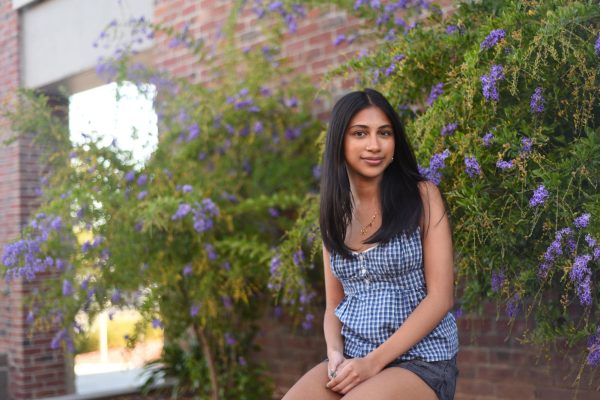TW: Suicide
For countless nights in eighth grade, I curled up under my covers, my legs sticky against the sheets as I stared at the ceiling, wide awake into the early hours of the morning. During the day, I felt listless and achy, my body weak, pulled down by some invisible weight that made it impossible to eat, sleep or even brush my teeth. The activities that had once brought me joy now felt like hell to sit through.
Even though I didn’t want to die, I had overwhelming fantasies of falling asleep and never waking up again. The idea of continuing life like I had been, exhausted and hopeless for the past couple of months, felt incomprehensible. My feelings of sadness bled into my daily life, inhibiting me both at school and home. So, my parents suggested seeing a therapist.
 Having someone to talk to, someone who would listen unconditionally and felt detached from my daily life, helped enormously. However, despite coming up with coping mechanisms, I still felt the lingering cloud of darkness above me. Though it wasn’t always intense or around for long periods, it remained in the back of my mind. A year later, my therapist formally diagnosed me. The minute the words came out of her mouth, a small part of the weight that had been pulling me down for months lifted. If I was depressed, at least there was a name behind the intense, consistent emotions I was feeling.
Having someone to talk to, someone who would listen unconditionally and felt detached from my daily life, helped enormously. However, despite coming up with coping mechanisms, I still felt the lingering cloud of darkness above me. Though it wasn’t always intense or around for long periods, it remained in the back of my mind. A year later, my therapist formally diagnosed me. The minute the words came out of her mouth, a small part of the weight that had been pulling me down for months lifted. If I was depressed, at least there was a name behind the intense, consistent emotions I was feeling.
I learned a multitude of ways to help myself and the signs to recognize when a depressive episode was on the horizon. My experiences with depression began to feel less intense and consuming. However, I still felt angry and ashamed that I had such thoughts. I refused to accept depression as a part of my identity, and so my hatred became constant, with every outburst a reminder that I might have to deal with depression for the rest of my life.
The most frustrating part of my depression was how random it felt. It arose at the most unexpected times and suddenly felt intense and debilitating. The TV shows and movies I watched taught me that there had to be a concrete reason for the way I felt. Following this criteria, there was no “real” reason for why I was experiencing depression. I hadn’t faced any significant trauma, my family wasn’t genetically predisposed for it, my parents weren’t divorced. I had people who loved me and a roof over my head. The volatility of my emotions despite my cirumstances made me feel like I was insane.
It wasn’t until a few months ago that I began to see depression less for its unpredictability and more for the positives it could bring me. One weekend at a speech tournament, my friends and I had a chaotic night that ended with all of us in the Jacuzzi simultaneously laughing and crying. As I sat with them, I realized that I felt almost euphoric. I had come so far from where I had been a year ago. And as I sat there, I also came to the realization that maybe I wouldn’t be feeling so much happiness if I hadn’t also felt such low feelings. Maybe it was the months of numbness that allowed me to feel such intense love.
Depression began to feel less like a burden I carried, and more like a part of me I had to care for. It’s not necessarily something I love or even like, but it’s still there, and not accepting that fact only hurts me. The less control I gave depression and the more I recognized it, the more it became a tiny aspect of who I was. Seeing depression for what it was and focusing more on the good parts it could bring allowed me to move on from my obsessive, self-effacing bubble. For months, I had reduced my existence to someone who experienced depression, and felt exhausted and angry because of it. Doing so denied that I was also a person who had so much to love and feel and experience.
I have so many reasons to live and a new mindset on the life in front of me, because there was a point when I didn’t want that life. Depression has brought me the recognition that life is short and that absorbing every moment is vital. I want to see my sister graduate and host movie nights with my parents and lay in bed with my friends while we plan our future apartment together. But more than that, I want to live for myself: I want to see the northern lights and have floor-to-ceiling windows and drink smooth matcha in a family-owned bookstore. And maybe my long list of reasons would have to come to me eventually, but perhaps it was also that I didn’t think I would survive to 18 that made me want to not just live, but thrive.
The depression that once controlled my life has since evolved into an aspect of me that I don’t enjoy but will stay, and so I am learning to adjust and accept and change. By moving away from unproductive obsession and focusing on what I can control — the way I talk to myself about depression and treat myself — I am not relegating myself to a singular identity and instead acknowledging that I can be a person who feels many different things at once.










